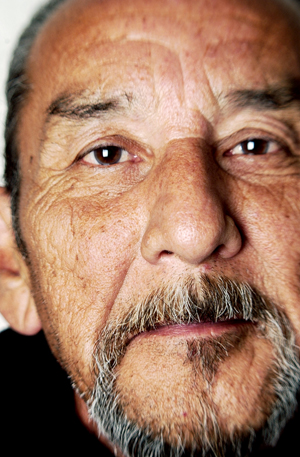
Shelter provides step up for those down on luck
Last winter Robert Gaxiola was on his way up from rock bottom
when a police officer found him sleeping in his truck.
Shelter provides step up for those down on luck
Last winter Robert Gaxiola was on his way up from rock bottom when a police officer found him sleeping in his truck.
“I’d just gotten a job,” Gaxiola said. “The police officer woke me up and said it was against the law to sleep in my truck.”
Instead of hauling him in for the night, the officer told him about the San Benito County Homeless Shelter. He headed out to Southside Road where the migrant camp doubles as a shelter for the homeless from the day after Thanksgiving to March 15.
“I really didn’t want to go. It was pride, fear, but I was welcome and you could tell,” he said.
Cindy Parr, the shelter manager, is used to people who are worried the first time they come to the shelter.
“If you can see someone is hesitant, we try to encourage them,” she said. “We will introduce them to the other people there. If they can’t relate to us, they might relate to another client.”
A world of trouble
Gaxiola has a weathered face from his years of hardship. His goatee is graying. So is the hair he pulls back to the nape of his neck. On a cold Friday night, he was dressed in jeans and a red flannel jacket.
“I had just started [work.] I hadn’t gotten paid,” he said, of the first night he went to the shelter. “I was hungry, cold, tired. I was sleeping in a truck and didn’t have a blanket.”
Gaxiola’s troubles started decades ago when he was sent to Vietnam at 18. He took a bullet to the chin when he was 19. He asks people who meet him to touch his face where a bar was put in his jaw and covered by a plastic plate.
“I felt after Vietnam I was going to hell. I took life,” he said. “It was a necessity just to survive.”
Through the years, he became addicted to morphine and heroin. He was in and out of jail. He was an addict when he moved back to Hollister a few years ago to care for his aging mother. When his mother died, he found himself without a place to live.
“I lost my dad, but when I lost my mom – when I lost her I lost all the love in the world,” Gaxiola said. “No matter how ugly you are, a mother still loves you.”
Every time he was in jail, his mother still visited him and refused to believe the things he was charged with.
At the shelter, he found Parr and former Executive Director Leigh Dietz. Dietz moved out of state with her family a few months ago.
A makeshift family
“I made a lot of friends and it turned into a family,” Gaxiola said. “At the time I needed somebody to just show love. It is hard on a person when he feels alone.”
While at the shelter, Gaxiola saved the money he was earning working at the construction site in the Save Mart shopping center. He stayed clean and sober through the months. He took advantage of the workshops offered through the year, including a Veterans Affairs clinic that helped him get proper discharge papers from his time in the military.
After the shelter closed, he rented a motel room every night.
“I was moteling it and that got expensive,” he said. “$79, 90 a night.”
Eventually Raul Bossi, a man Gaxiola had met at the shelter, told him of a trailer on Frazer Lake Road that had a room for rent.
“I finally got a room and I’m okay,” he said.
The thing that helps Gaxiola stay sober and keep things together is his belief in God. He started reading the Bible and realized people in the stories – Moses, David, – took life.
“I took all the negative and put it in a trash bag and put them at the cross,” Gaxiola said. “I love this life.”
He stays busy most days, overseeing the continuing construction on McCray Street, and building fences on his own over the weekends. He still sees friends from the shelter around town.
“When I run into them, I always get a handshake and a hug,” he said.
A drive to destruction
As with Gaxiola, it was substance abuse that led his friend Bossi to the homeless shelter. Bossi has smooth skin, dark lashes and a quiet demeanor. He is less open than Gaxiola when it comes to sharing about his life.
Bossi was stopped for driving while intoxicated and it started his life on a downhill slide. He lost a job in San Jose where he was making more than $50,000 annually. He couldn’t pay his rent and was soon evicted.
“My license got suspended so I couldn’t get to work,” he said. “I got a temporary job, got unemployment, but I couldn’t work. I had no license, no house. It was a domino effect.”
He moved back to Hollister where he had grown up.
“I was living with my sister, but I felt like I was imposing,” he said. “So I decided to come to the shelter so I could come and go.”
He stayed at the Hollister shelter until it closed in March.
“I came here to find a way back up,” he said.
After that, he stayed in Gilroy until the end of the month at the Armory Shelter there. He moved to San Jose, where EHC Lifebuilders reserves 30 beds at their shelter each night for Veterans.
During his time at the shelters, he saved up money to get his license back and pay off fines.
A friend told him about the trailer on Frazer Lake, but Bossi decided to enter a program in Menlo Park for 90 days to help him stay sober.
“For extra insurance,” he said, of the program.
Now he has a job based in Watsonville, working construction.
One step at a time
“I’m stable and taking one thing at a time,” he said. “I went from an apartment to nothing and now I’m going back the other way.”
Things have also looked up for another former resident of the homeless shelter. Jesse Polk found himself without a place to live when he was released from county jail last year. He had been arrested for possession. While in jail, a pastor from Grace Baptist Church talked to him about his options when he got out.
“I didn’t know about going to the shelter,” he said. “I didn’t want a hand-me-down. But it was cold in my car and I didn’t want to get pulled over.”
On a recent night, Polk was dressed in a Cimino’s Cabinet Door shirt, with a green hat and green jacket.
“I would have been out in the streets with nowhere to go and nothing to do,” Polk said. “It would have been more difficult.”
At the shelter, he found acceptance from Dietz and Parr.
“Leigh was a good impression. She did a lot to help me out,” he said.
One thing the shelter staff tries to do is help people find jobs or a new place to live when they are ready.
“They helped me find a job,” he said.
His first job was driving deliveries for Community Pantry, the local food bank. He would drive to the shelter, Rancho Apartments and other places where food is distributed.
“One thing that is important is having a goal,” he said. “It makes sure you don’t screw up.”
Polk now drives for Cimino’s Cabinet Doors, some times delivering supplies as far north as Santa Rosa. He still attends Grace Baptist Church and is drug-free.
A home in Aromas
His time at the shelter allowed him to save up money and find a place in Aromas to put a trailer he owned.
“I still come by and stayed one night,” Polk said, of his connection with others at the shelter. “I want to let them know I’m not too proud.”
All three of the men still stay in touch with Parr, the manager of the shelter. If she doesn’t hear from them for a while, she calls them to check up on them.
“It’s like our kids have grown up and moved out,” she said. “It’s like our babies have left the nest.”
While the shelter staff offers programs on substance abuse, mental health services and VA workshops, Parr acknowledges that the clients need to do the work.
“It’s all about how much they want to apply themselves,” she said. “What we can do is set up workshops and help them find an apartment…I believe everyone who comes through that door has the choice to change their lives.”
While Gaxiola, Bossi, and Polk shared their stories of success on a cold night last week, another client who was back at the shelter again this year told Parr he felt he should have been a success, too. She told him he could be a success this year.
“I tell them if they get to that point, doors are going to open left and right,” Parr said. “It’s gotta be a lifestyle you will no longer accept.”
Shelter still short of funds
As temperatures dipped into the 30s this week, the Homeless Task Force is still trying to raise money to keep the shelter open through March 15. An emergency grant failed to come through this year, leaving the shelter $20,000 short of its annual operating budget.
The Task Force members launched a matching fund campaign in November to raise the funds by Dec. 21. The date is the longest night of the year and coincides with a national memorial for the homeless who have lost their lives on the streets
Task Force members have already approached local businesses and asked them to pledge matching funds for all the money raised from individuals.
Businesses that have pledged include Pacific Gas and Electric Company; Cedar Valley; Teknova; DMB El Rancho San Benito; San Juan Oaks; Milgard Windows; San Benito Bank; Marilyn Ferreira Real Estate Inc.; Pietra Santa; Graniterock; BLI; and Casa de Fruta.
“That’s really good for this time of year,” said Kathy Ruiz, chair of the Task Force. “Other money is coming in from individuals.”
The committee is still $6,000 away from its goal.
Ruiz has been involved with the Task Force since its inception, and before that worked with the Marley Holte Foundation and Sacred Heart Church on supporting the homeless.
“If we care for everybody, then we can’t have some people sleeping in the streets in the cold weather,” she said. “It’s not humane to have that happen to some people.”
Donations can be sent by mail or dropped off at the Pinnacle newspaper office, 350 Sixth St., Ste. 102, Hollister, CA 95023.






